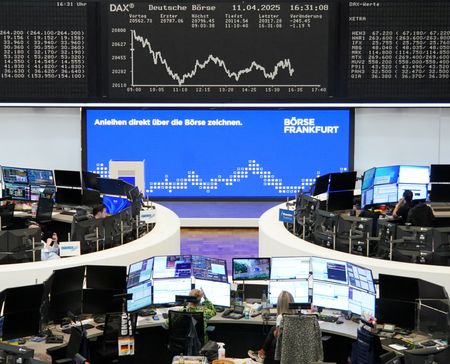By Dave Graham
ZURICH (Reuters) – U.S. President Donald Trump’s decision to hit Switzerland with steeper tariffs than most of Europe was a major shock to the export-oriented country, pushing it towards the European Union as it scrambled to contain the fallout.
While there was relief that Trump temporarily lowered his tariffs on Wednesday, for advocates of stronger ties the episode confirmed their argument: that a more unpredictable world means Switzerland must increase engagement with its EU neighbours.
Switzerland took an initial step toward closer economic integration in December when it reached a political deal with Brussels to overhaul their joint trading relationship.
That EU deal faces a long approval process, but Swiss President and Finance Minister Karin Keller-Sutter pointed to it in a Wednesday newspaper interview as she took stock of Switzerland’s options following the U.S. trade broadside.
“We want to stabilize, deepen relations with the EU,” she told the Neue Zuercher Zeitung daily.
Neutral Switzerland has combined a low-tax business model with direct democracy to create a stable, open economy which is wealthier than nearly all EU member states. That has fed both national pride and resistance to being absorbed by the bloc.
After Trump imposed tariffs, Keller-Sutter said she quickly spoke to EU Commission President Ursula von der Leyen and agreed to stay in close touch on how they should proceed.
On Friday, Keller-Sutter will become the first Swiss finance minister to participate in a regular meeting of her counterparts from the EU, which Trump last week hit with a 20% tariff, well below the 31% he put on Switzerland. Both now face 10% duties.
Keller Sutter’s invitation to the informal ECOFIN meeting in Warsaw predates Trump’s re-election, but her attendance comes as Switzerland is stepping up cooperation with the EU in strategic areas in response to geopolitical upheaval, including Russia’s war in Ukraine and the U.S. shift towards protectionism.
Jean-Philippe Kohl, deputy director of industry association Swissmem, said the U.S. policy shock made it even more urgent for Switzerland to approve the new Brussels deal and cement the future foundations of ties with its biggest market, the EU.
“Maybe a few more percent of people will grasp that we must at least be good with the EU and can’t create additional problems with China if the U.S. falls away,” he said.
Yet with major economies such as Germany struggling, Switzerland will need to expand its business footprint outside Europe, Kohl said, pointing to India and Southeast Asia.
The Swiss foreign ministry did not immediately reply to a request for comment for this article.
NEW WORLD ORDER
The EU accord faces a tough ratification process in Switzerland, where the bloc is seen by critics as a bureaucratic hindrance and undemocratic affront to Swiss sovereignty.
Franziska Roth, a lawmaker for the centre-left Social Democrats (SP), said if the deal clears parliament it will face a struggle in any referendum unless it ensures that Swiss living standards like higher wages are protected.
But she pointed to a parliamentary resolution backed last month with strong cross-party support that urged the government to seek a stronger security role in Europe and to explore scope for more Swiss security cooperation with the EU.
That showed most parties now believed Switzerland only had a secure future in partnership with the EU, Roth said.
The country’s biggest party, the right-wing Swiss People’s Party (SVP), remains a powerful holdout, vigorously opposing closer EU ties. But it was not pleased by the U.S. tariffs, with longtime SVP leader Christoph Blocher calling them “absurd.”
Daniel Woker, a former Swiss ambassador, said that with old certainties crumbling, getting closer to Europe was vital.
“Trump is destroying the existing order. And he wants a completely different world order, not just on trade,” he said. “This can only hurt Switzerland, which has unquestionably benefited greatly from the current world order.”
(Reporting by Dave Graham; Editing by Toby Chopra)











